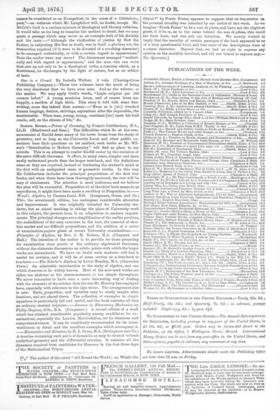Sonoof. BOOES. — Primer of Geometry, by Francis Cuthbertson, M.A., LL.D. (Blackwood
and Sons.) The difficulties which lie at the com- mencement of Euclid deter many of the lower forms from the study of geometry, and so long as the University Local and other public ex- aminers base their questions on his method, such books as Mr. Wil- son's "Introduction to Modern Geometry" will find no place in our schools. This is an attempt to render Euclid easier by the omission of the more difficult theorems. It offers, in many cases, simpler and more easily understood proofs than the larger text-book, and the definitions come as they are required, instead of burdening the student's mind at the first with an undigested mass of geometric truths. In this way Mr. Cuthbertson includes the principal propositions of the first four books, and when these have been thoroughly mastered, the rest will be easy of attainment. The selection is most Judicious, and we believe the plan will be successful. Proposition vi. of the third book seems to ns superfluous, it might have been made a corollary to Proposition iv Wood's Algebra, by Thomas Lund, B.D. (Longmans, Green, and Co.) 'This, the seventeenth edition, has undergone considerable alteration and improvement. It was originally intended for University stu- dents, but as school teaching is taking the place of University work in this subject, the present form is an adaptation to modern require- ments. The principal changes are a simplification of the earlier portions, the embodiment of the easy exercises in the text, the removal of obso- lete matter and too difficult propositions, and the addition of a series of examination-papers given at recent University examinations. Principles of Algebra, by Rev. J. H. Robson, MA. (Chapman and Hall.) The intention of the author is to provide for those preparing for examination clear proofs of the ordinary algebraical theorems, without the elaborate discussions on subtle points with which the larger works are encumbered. We have no doubt such students will find it useful for revision, and it will be of some service as a text-book to teachers.--The Scholar's Algebra, by Lewis Hensley, MA. (Clarendon Press.) An admirable introduction to the study of algebra, and one which deserves to be widely known. Most of the now-used works are either too abstruse at the commencement, or too simple throughout. We never remember to haie seen a more interesting way of dealing with the elements of the science than the one Mr. Hensley has employed here, especially with reference to the sign minus. The arrangement also is new. Ratio, proportion, and variation may be easily taught after fractions, and are placed there. The collection of examples in simple equations is particularly full and useful, and the book contains all that an ordinary student requires.—Lessons in Elementary Mechanics, by Philip Magnus, B.Sc., B.A. (Longmans.) A second edition of a work which has attained considerable popularity among candidates for ex- aminations, especially the London Matriculation, for its clearness and comprehensiveness. It can be confidently recommended for its trust- worthiness in detail and the excellent examples which accompany it. —Kinematics and Kinetics, by E..T. Gross, MA. (Rivingtons and Co.) A treatise containing such parts of dynamics as may be treated without analytical geometry and the differential calculus. It contains all the dynamics required from candidates for Honours in the first three days of the Mathematical Tripes.


































 Previous page
Previous page